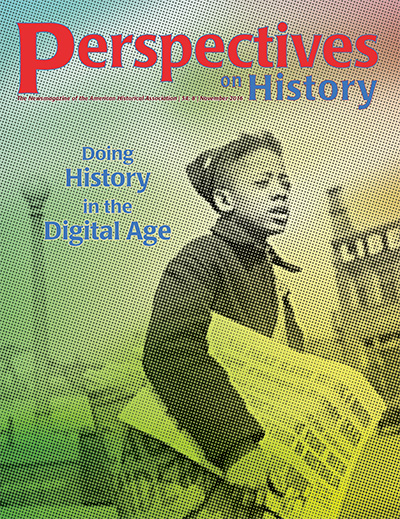Growing Pains and Growing Pleasures in Digital History: Announcing the November Issue of Perspectives
It’s fair to say that historians have assimilated the so-called digital turn in at least some aspects of their work. Many now know how to teach students the critical use of Wikipedia and no longer seek to ban it outright. Some who are fortunate enough to work at institutions with dedicated lab spaces have learned about digital tools available to them in teaching and research. At a minimum, most historians expect some primary sources relevant to their work to be available online.
 AHA publications, including Perspectives and AHA Today, have covered digital history with a critical eye for years. The editors are neither blind enthusiasts nor analog purists. In the new issue of Perspectives, we’ve assembled a group of articles that do not issue the “go digital or else” imperatives that rightly ruffle many in our community—they explore possibilities and complications of the digital age.
AHA publications, including Perspectives and AHA Today, have covered digital history with a critical eye for years. The editors are neither blind enthusiasts nor analog purists. In the new issue of Perspectives, we’ve assembled a group of articles that do not issue the “go digital or else” imperatives that rightly ruffle many in our community—they explore possibilities and complications of the digital age.
As Matthew Delmont shows in our cover story, one of the greatest potential upsides of the digital world—wide dissemination of research findings—can also make digital history seem less than serious to hiring and promotion committees and administrators. This is particularly relevant to historians of marginalized communities, many of whom are committed to making their work accessible to people in those communities, including collaborating with them when possible. The AHA, Delmont notes, recently crafted much-needed guidelines for the evaluation of digital scholarship, yet a new wave of scholars still must decide whether to pursue digital projects before or after tenure.
From Michigan State University, which has long been a pioneer in digital initiatives, comes a dispatch co-authored by recent graduate DeLacey A. Yancey, history department chair Walter Hawthorne, and lab director Brandon Locke. MSU’s Lab for the Education and Advancement in Digital Research (LEADR) began as a storage room in an older building. It soon came to nurture student digital history projects, like Yancey’s website dedicated to teaching children about African American inventors: BlackMVPatents. As Yancey writes, she had never considered making any of her undergraduate projects public. LEADR gave her a sense that she could “do history,” too. (She’s now an MSU graduate student in arts and cultural management, with a concentration in museum studies!)
Digital dissemination leads to other potential pitfalls. Rick Anderson, a prominent figure in the world of scholarly communication, dissects the issue of licensing as it pertains to historical scholarship. You’ve probably heard of Creative Commons licensing, but what are the pluses and minuses of signing a publishing contract that requires it? How does CC licensing overlap with open access? And what should you know as a graduate student about copyright and open access before you submit your dissertation? Scientists have been grappling with these questions for some years, but their solutions might not be neatly applicable to humanities scholarship.
In our News section, associate editor Kritika Agarwal turns toward a related question within the digital landscape: what are the ethics of digitizing archival sources and making them available online, particularly when they involve sensitive information or contested provenances? Accustomed to deep consideration of policies regarding access and consent, archivists today are also working through the implications of a vastly expanded public for historical sources. This can potentially include law enforcement officials, of no small concern to archivists looking to help political movements document their activism on social media.
There’s more than the digital life in November’s Perspectives. Looking forward to our 131st annual meeting in Denver, we anticipate a heavy turnout for a session on the controversy over the Jefferson County, Colorado, school board’s attack on the AP US history curriculum, in 2014. The University of Northern Colorado’s Fritz Fischer reminds us that even though the conservatives on the school board were ousted in 2015, the central issue in the fight—namely, whether US history courses should promote patriotism—is a national one that has not gone away. “The Jefferson County Showdown over the Advanced Placement US History Test” will bring together historians and history teachers from all political backgrounds, making it a don’t-miss event in Denver.
There’s a great deal more in Perspectives this month, including Julia del Palacio’s path from dancer to history PhD to arts administrator; a reminder that e-mail humanities advocacy is important and easy; a tribute to this year’s AHA Honorary Foreign Member, Boubakar Barry; an interview with religious studies scholar Leigh Eric Schmidt; and a run-down of notable documents newly declassified by the federal government.
If you like what you see, please join the AHA if you’re not already a member.
This post first appeared on AHA Today.
Tags: AHA Activities AHA Today Digital History
Comment
Please read our commenting and letters policy before submitting.






